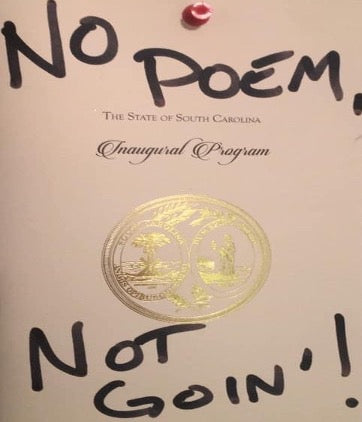The Poem That Changed My Life
By: Marjory Heath Wentworth
I love to hear writers describe the inspiration for their work. The origin story for a poem or novel is often fascinating and illuminates the material. But we rarely hear about the ways the work impacts the writer’s life in unexpected ways. I have written extensively about the inspiration for my poem “One River, One Boat.” I have also described the unexpected reaction to the poem, especially when I was not allowed to read it at Governor Nikki Haley’s second inauguration and Congressman James Clyburn read the poem into The Congressional Record, and Senator Marlon Kimpson read it on the South Carolina Senate floor in January 2015.

When I eventually published the poem, I dedicated it to two people: the late Walter Scott, an unarmed African American man who was fatally shot in the back by North Charleston Police Officer Michael Slager on April 4, 2015, and the late Muhiyidin d’Baha, a Black Lives Matter activist who had access to a videotape of Scott’s murder which was ultimately brought to the authorities. Muhiyidin, also known as Moye, organized protests during the days following the Scott shooting. The protest was scheduled the weekend I was being inducted into the South Carolina Academy of Authors. Muhiyidin contacted me and asked me to read “One River, One Boat” at a protest outside of North Charleston City Hall on April 10th. I agreed and drove straight from a fancy cocktail party honoring me and my friends, Dottie Frank and Bret Lott.
 With Dottie Frank and Bret Lott at our induction into the South Carolina Academy of Authors, April 2015.
With Dottie Frank and Bret Lott at our induction into the South Carolina Academy of Authors, April 2015.
When my husband and I arrived in North Charleston, the scene was tense in the City Hall parking lot where the police department offices are housed. News vans were lined up on the street. There were several speakers: some people came to the front and asked for prayers, many others shared their own stories of unjust run-ins with law enforcement. Candles were lit in honor of Walter Scott, and the authorities kept their distance. Muhiyidin held a megaphone in front of me while I read the poem, so people could hear me. My words mattered to this crowd of sad, terrified, and angry people. During a hectic weekend filled with friends and family celebrating my literary accomplishments, sharing my poem “One River, One Boat” at the North Charleston protest is what shines in my memory like a star that never goes out. And that is the moment when I felt that I had finally become a true poet

Muhyidin and I discovered that we were like minded, and soon we became friends. A couple of months later, on the morning of June 17, we were going to meet up and discuss a video that would expose iconic images tied to Charleston’s role in the Atlantic Slave Trade; instead, we were texting each other in disbelief about the Emanuel Church murders the previous evening. He was organizing community events, and I was tasked with writing the poem “Holy City.” The entire community was joined together in grief and fear.
Government officials filled the pews inside Morris Brown AME Church. Hundreds of people were gathered outside, where Muhiyidin was drumming. Whatever happened next in Charleston, we were in this together.
I am not sure I could have written the poem “Holy City,” if I had not written “One River, One Boat.” I understood immediately that I was a witness to something so much bigger than me, and I would not have had the confidence to speak for my community if I had not received such a warm response for the poem. The response to the poem “Holy City” was equally supportive and led to my collaboration with historian Dr. Bernard Powers and journalist Herbert Frazier on our book We Are Charleston: Tragedy and Triumph at Mother Emanuel.
The people I met during the process of writing this book are some of the bravest people I have ever known. It took tremendous courage for the families who had lost loved ones in the Emanuel Church shooting to sit down and talk about the worst thing that ever happened to them. I was a witness, documenting and sharing their stories with the world. They trusted me and my co-writers, and it was a daunting responsibility. Meanwhile, Muhiyidin spoke out for social justice, racial equity, and healing — leading protests, vigils, and drum circles. He organized Charleston Days of Grace that fall, and his efforts on behalf of the African American community were boundless. But in February 2018, while visiting New Orleans, he was shot and killed. He was just 32 years old.
Dedicating my poem “One River, One Boat” to Muhiyidin D’Baha and Walter Scott was inevitable. The violence that led to their untimely deaths, is now a metaphorical thread woven into the poem. But, of course, I wrote a eulogy for my friend Muhiyidin that was read at his funeral. Poems – Marjory Wentworth.
I am left with so many conflicting, complicated emotions about the work and the experiences from 2015: grief and gratitude swirling together in a bittersweet combination. Documenting two life changing events in this historic city, bound me to Charleston forever. It is hard to see what is next along this unexpected trajectory, so I will close with the message my friend Muhiyidin included at the end of every email: “Have fun dreaming.” I will never stop believing in the better world he believed we could create.
Here are some of the highlights:
PBS News Hour | A year after shooting, South Carolina poets offer healing | Season 2016 | PBS



CNN Democratic Presidential Town Hall, Columbia, South Carolina, February, 2016.



